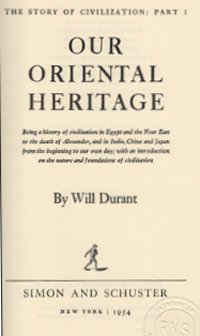 Well, gentle reader, I have done it.
Well, gentle reader, I have done it.
All right, I have not read the Durants’ The Story of Civilization series, but I have read the first volume which is a step in that direction. I bought most of the series in 2019, but I had to order this book from Ebay or Amazon. It’s got the embossed stamp of the previous owner, one R. Neil Schirke, on the title page, but the previous owner did not read it. Or so I assume, as this edition was poorly cut so that some of the pages were still wed together at the bottom–I carefully tore them when I needed to turn them, but some portions of the table of contents and index remain unseparated.
I have a bunch of little paper flags in the book, but it’s a lot, so I won’t drop them all here. Instead, I’ll parcel them out as “The Wisdom Of….” posts perhaps. Or I’ll get tired of having the volume on my desk (although I don’t have a place to put it on the Read shelves of Nogglestead with room for its fellows, so no rush).
But I will comment a bit on the Durants’ style and whatnot.
This book covers thousands of years in its almost 1100 pages. It starts out with a “book” defining what it means by civilization–basically, the structure of society and the art that comes with it which distinguish a civilization from a tribe. Then it delves into different civilizations by location and time period starting with the early Mesopotamian civilizations (Sumeria, Egypt, Assyria, Judea, Babylonia, and so on) in the near East; Indian civilizations in the Indus valley; Chinese dynasties; and then Japan (no love for Korea or Mongolia, for example, although the appropriate dynasty is covered in the book on China).
Each “book” within this volume goes through the civilizations discussed not entirely in chronological order, but rather chronological order by topics. So you have a timeline of government and/or social organization, and then you have chapters dedicated to various arts and occupations from industry to writing, philosophy, religion, poetry, sculpture, architecture, and/or painting, and sometimes you get these in sections of chapters which are themselves broken out chronologically. It makes it a little difficult to follow when the chapters discuss which artist was supported by which ruler–I admit I did not take copious notes whilst reading, and so I do not have a solid handle on some of the names and their eras.
Additionally, Durant (or Durants) is (are) Old Left. Which means you get some Marxism mixed into the book, with its attendant glorification of the proletariat (called proletariat and the working people are called proles, for real), denigration of “conservatives,” and even love given to leaders who redistribute wealth–but every time it happens, the system collapses under corruption which the authors blame on the corrupt people and not a system where corrupt people rise to the top. But it’s very subtle, and it only colors the work (red) a little.
Some of the early stuff where there isn’t documentation is a bit speculative, and the more closely that the history comes to Durant’s time, the more it is more current events reporting (and henced colored by his politics). The Durants are quite homers for every civilization–each in this book (and the start of the next) find something superlative for each civilization. Which is encouraging and engaging to read.
I’d wondered what it would be like to read a Chinese history written before the Communist revolution, and this one fits. To be honest, I don’t see a whole lot of difference, though. It talks about the Revolution, but it does not mean the Communist revolution–it means the revolution that overthrew the Manchu (Qing) dynasty, which ended in 1912. That is to say, within twenty-some years of the book’s writing. Living memory. The last imperial dynasty was closer to this book than the Clinton administration is to today (and more so true if you’re reading this in the archives and not in August of 2023). That’s an interesting perspective.
Which leads me to pop off with a couple of other footnotes of events that occur after this book is written that affects the areas the book covers:
- India becomes independent.
- Israel becomes a Jewish nation.
The book ends with a “book” on Japan and with a section questioning whether the United States and Japan absolutely had to go to war. Whether or not we had to, we did, and that was a long time ago. Ninety years on, and we’re looking at a new dynasty in China which might be losing its grip and a regime in the United States that might be losing its grip and might pen a piece Must the United States and China go to war? But this would be commentary on current events, not history, not even the first draft of history, but rather what concerns learned men have today and not actual events that have unfolded.
Fortunately, the further volumes in the set deal with ages in Western and European civilization, so we won’t get too much more commentary except for the Old Left flavor.
So I’m on my way, and if I read two volumes of the set per year, I’ll finish in…. 2028. Although that’s discouraging–I’m getting to the age where I wonder if I won’t finish before five years from now–it’s a project I’ve undertaken, and I’m proud to have started. I’m also excited enough about it that I’ve bored people talking about Chinese history at the only party I’ve attended in recent history. So I guess it’s for my own enjoyment and amusement. And yours, gentle reader, and you can think I’m doing it all for you if you would like.



1 thought on “Book Report: Our Oriental Heritage by Will (and Ariel) Durant (1935, 1954)”
Comments are closed.